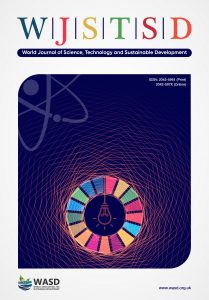Investigating energy consumption and economic growth for BRICS-T countries, Durmuş Yıldırım, Seda Yıldırım and Isıl Demirtas
 Durmuş Çağrı Yıldırım, Seda Yıldırım
Durmuş Çağrı Yıldırım, Seda Yıldırım
Namık Kemal University, Tekirdag
Turkey
Email: sedayil1@gmail.com
Isıl Demirtas
Giresun University, Giresun
Turkey
DOI: 10.1108/WJSTSD-12-2018-0063
Purpose: The purpose of this paper is to explore the relationship between energy consumption and economic growth for Brazil, Russia, China, India, South Africa and Turkey (BRICS-T) countries. In this context, this study investigates energy consumption and real output in BRICS-T countries through panel cointegration.
Design/methodology/approach: The data include energy consumption and real output for BRICS-T countries and period of 1990–2014. The variables are transformed into natural logarithm. To analyze these data, this study employed Pedroni cointegration test, the second-generation panel cointegration test, Westerlund and Edgerton (2008) test and FMOLS test.
Findings: Results indicate that there is a bi-directional causality relationship between energy consumption and economic growth for BRICS-T countries. An increase in GDP leads to an increase in energy consumption and an increase in energy consumption leads to an increase in GDP.
Research limitations/implications: This study used data that include the period of 1990–2014 for BRICS-T countries. So, further studies can use different periods of data or different countries.
Originality/value: This study provides important evidence that countries with strong growth performance need to follow bi-directional energy policies to increase both energy investments and ensure energy savings.
Keywords: Economic growth; Energy consumption; Panel cointegration; BRICS-T.
Citation: Yıldırım, D.Ç., Yıldırım, S. and Demirtas, I. (2019), "Investigating energy consumption and economic growth for BRICS-T countries", World Journal of Science, Technology and Sustainable Development, Vol. 16 No. 4, pp. 184-195. https://doi.org/10.1108/WJSTSD-12-2018-0063

